Staying Fit

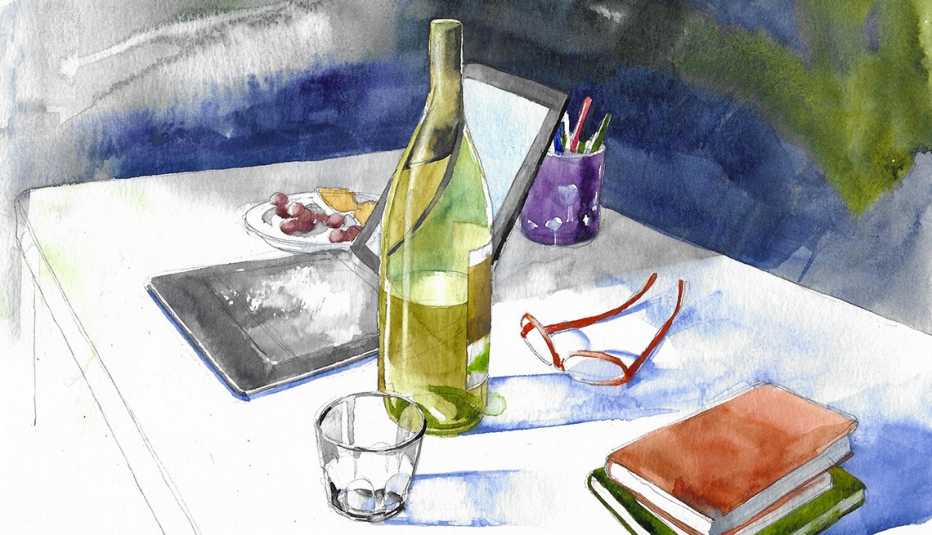
Listen to chapters 37-42 narrated by Jack Holden, or scroll down to read the text.
Chapter Thirty-Seven
MATTHEW AND ROSS WERE walking away from Mary Ford’s house.
‘What do you think?’ Ross said. ‘Seems a bit odd. A grown woman sending love letters to some bloke she scarcely knew.’
Venn said nothing. His romantic dreaming had begun when he was an adult too. He’d first met Jonathan at a training session in a smart hotel in Barnstaple and suddenly his world had expanded and seemed full of possibilities.
He thought he’d send Ross and Jen back to Barnstaple at the end of the day. There was no point all of them camping out any longer in the Maiden’s Prayer, and they’d be more useful with the rest of the team in the police station. Matthew decided that he would stay in Greystone, though. He still believed that the answer to both murders lay there.
+++
Alan Ford’s house was on the edge of a grand country estate; they’d glimpsed a stately home with parkland as they’d approached. Once, perhaps, the cottage had been the home of an employee of the big house, of a gamekeeper or gardener.
It was semi-detached and the adjoining house mirrored its neighbour, and must have been a tied cottage too. Mary Ford would have grown up here, surrounded by woodland and birdsong. Venn wondered when the sea had first worked its magic and pulled her to Greystone. There was a small garden to the front, still bright with autumn colour. Venn moved along the lane so he could see into the land at the back. Here the garden was thin, but long, stretching all the way to the wood. Close to the house there was a pond, with muddy edges; further away, vegetable patches and a coop with hens. Matthew was reminded of his first meeting with Eleanor Lawson, as she appeared out of the mist with a basket of eggs on her arm. Right at the end of the strip, there was an orchard, so it was hard to tell where Ford’s land ended and the woodland belonging to the estate began.


AARP Membership— $12 for your first year when you sign up for Automatic Renewal
Get instant access to members-only products and hundreds of discounts, a free second membership, and a subscription to AARP the Magazine.
A car was pulled into a space by the side of the house. Matthew was thinking that Ford must be at home, or at least not very far away, when suddenly the man appeared, walking round the house and past the car towards them, a dog at his heels, a pair of binoculars round his neck.
‘Come in!’ His voice was welcoming. ‘Mary said you might come along.’
He led them, not to the front door, but the way that he’d come. Close to the house there was a flagged area, with varnished wooden furniture tipped up so any rain would run off. Matthew could see the garden more clearly now. There were bird feeders hanging from posts along the border fence, and in one of the more substantial trees in the orchard, a wooden tree house had been built. Perhaps that had once been Mary’s, used now by the man’s grandchildren.
Ford opened the back door and pulled off his boots. ‘Tea?’ he said. ‘If my wife were still alive, there’d be homemade cake in the tin, but at least I can run to supermarket biscuits.’
‘Did Mary tell you why we wanted to speak to you?’ They were sitting in the kitchen with its window facing out into the garden. Occasionally Ford would lift the binoculars to check a bird on the feeder, but Venn thought they had his full attention. ‘We have a photograph of a woman. She might have been the person you saw at the bottom of Quarry Bank the night Rosco was killed. Could you take a look?’
‘Sure.’ A pause. ‘I don’t think I can be certain, though. I only saw her briefly in the street light. I wouldn’t want you to convict someone just on what I might have seen.’
Venn shook his head. ‘Really, there’s no danger of that. We’re much more wary of identification evidence these days. We know how people’s memories can play tricks. But you’re good at holding details in your head and it might just help us to look in the right direction.’
Ross put his tablet on the table and the image of Imogen Holt came onto the screen.
‘Could that have been her?’
Ford stared at the photograph. It was sharp and close up, a publicity shot of the face. He took a while to respond.
‘Honestly, I can’t say. I was upstairs looking down and I didn’t see her face at all clearly. It was more of a silhouette. Do you have something taken from further away? Sometimes the way someone stands and moves helps us to recognize them, don’t you think?’
Ross pressed some buttons on his device and there was Imogen on the screen again. The picture had been taken outdoors on set when Imogen had been acting in a soap opera. It was full-length and she was dressed in a long coat, much as the one Ford had described the mysterious woman as wearing.
‘You know,’ Ford said, ‘that could be her. I certainly couldn’t go into court and swear to it, but there’s something about the stance ... She’s very upright, the spine very straight, the neck long, as if she’s a dancer.’
‘Thank you.’ Venn wasn’t sure that this got them much further. The team was already checking with other taxi drivers, who could have met trains in Tiverton or Exeter on the night of Rosco’s death. Nobody reported having collected the woman, but that didn’t eliminate Imogen altogether. ‘There was something else we wanted to ask. I don’t know if Mary mentioned it.’
‘Something about Scully Head?’
‘Two bodies were found there within a week. It would have taken some effort to get them there. Rosco’s death seemed especially elaborate. Why bother with all the show? We know about the superstitions – the skulls and the bones and the white, white light – but we wondered if there was something more tangible about the place that might link the two men. Mary thought you might have some idea.’
‘Did she?’ Ford frowned. ‘I can’t think why.’
‘Because you’ve lived locally for most of your career. I’m guessing you’d have been doing a seabird census along those cliffs over the years. You might remember some incident, another death or a suicide perhaps.’ As he spoke, Matthew thought how tenuous this sounded. Two experienced detectives were here, drinking tea and fishing for stories, when there were so many more important things to do. It seemed faintly ridiculous.
‘You think Scully might have some significance to the killer?’
‘It’s one theory we’re exploring. Mary thought there might once have been a suicide there.’
‘I think there was something. A Morrisham businessman who went bust, and jumped to his death, but that was years ago.’
That triggered a memory for Venn. Someone else had mentioned the incident in connection with the case, but he hadn’t heard the precise location of the suicide and he hadn’t made the link.
‘Can you remember his name?’
There was a silence. Ford seemed to be scrolling through his memory. He was a naturalist, used to recalling and identifying birds and insects. He would, as Venn had already said, have a good memory. He looked across the table at them, with a new awareness. ‘His name was Lawson. Henry Lawson. He was Bartholomew Lawson’s father.’
Just as Venn had expected.
+++
They left soon after to drive back to Greystone. Venn asked Ross to take the wheel; he knew he would struggle to concentrate. His mind was racing, running once more through various scenarios, questioning his judgement, everything he’d previously treated as a certainty. Could Bartholomew’s death be suicide, after all? It would be almost impossible for a postmortem to tell how the man had begun the long fall to the bottom of the cliff. Then, the thought came more insistently: why hadn’t Eleanor given Venn or his sergeant the details of her father-in-law’s suicide? Matthew only had her word for the fact that Barty’s mood had been stable, and that he wasn’t the sort of man to kill himself. She was of a generation to be reticent about matters of mental health. Would she have confided in Venn if her husband had been severely depressed? If he had decided to take the same way out as his father? Would she consider suicide cowardice? A scar on her husband’s reputation. As a Catholic, would she consider it a sin?
Matthew pushed the theory on, and let another possibility scroll out in his mind. Could Eleanor have assisted in her husband’s suicide? Could she have picked him up from the sailing club car park and driven him to the coastal path? Venn imagined her, standing there beside him at the top of the cliff, looking down into the darkness, quiet, resolute on her husband’s behalf, waiting for him to jump. But why would she do that?
The answer came to Matthew immediately and with clarity. Because she knew that Bartholomew was a killer. Perhaps the man had confided in Eleanor when he was drunk. Matthew could picture him, maudlin and sentimental, not strong enough to keep the details of his guilt to himself, wanting to offload them onto his wife. And Eleanor would be strong. She would hate the publicity of a trial, but she would want retribution for the death of her former lover. Could she have persuaded Bartholomew to take the same way out as his father? Matthew thought it was possible.
They were approaching Greystone now, but Venn hardly noticed. He was juggling ideas. Could Bartholomew, the drunken boor, have planned the murder of Rosco? They’d thought it unlikely, but perhaps it was possible. According to Jen’s feedback after her chat with Cynthia Prior, Lawson had managed to maintain his role as magistrate, despite his drinking, his bullying and his arrogance. And he’d been sailing for as long as the victim had. He knew the coast, the tide and the weather. He might be unfit but he was a big man. It wouldn’t be hard for him to overpower Rosco, especially if he’d taken him by surprise. And he would have taken him by surprise. There’d been no lock on the bathroom door in the house in Quarry Bank.
Again, Venn let the possible scenario roll out in his head. Ross had stopped asking questions about Ford and the ID of Imogen, once he’d realized Matthew was preoccupied with thoughts of his own, and now Matthew could see the little house by the quarry more clearly in his mind than the approach to the village outside the car windows.
Had Lawson got wind of Rosco’s arrival in Greystone? News would have spread in the area. Harry Carter would have seen it as an opportunity to pull in the punters to the Maiden’s Prayer. Guess who comes in for a pint with us every night, boys. The Morrisham darts team had played there, so word would have got out that way, even if Carter had been more discreet about his celebrity drinker. Had Lawson been scared that Eleanor would leave him for her childhood sweetheart and come to Greystone to challenge him?
Again, Venn believed he could see how that might have played out. Rosco would have mocked Bartholomew, challenged him, provoked him. That was the sort of man Rosco had been. Perhaps the champagne and the glasses had been set out to taunt Lawson. Guess who I’m expecting later! Of course. My own sweet little Nelly Wren. So, when Rosco had gone to the bathroom to use the lavatory or wash his hands, Lawson had followed him. Stabbed him. Either with a knife he’d brought from home, a knife he’d use on his boat, or with one of Rosco’s. And he’d killed him, driven at last to a sort of frenzy.
Venn ran the theory on, trying to find holes, something that wouldn’t hang together. Bartholomew would know Sammy Barton and know the Moon Crest. As commodore of the sailing club, he’d surely have had dealings with the lifeboat operations manager. Matthew thought there might well have been bad feeling between them. Two powerful men fighting over their own territory, separated by class and religion. A toxic mix. Venn couldn’t imagine that they’d get on.
It would please Bartholomew to implicate Barton, by taking the Moon Crest tender. He was a large man, strong if he still sailed. He could have bundled Rosco’s body into the enormous canvas bag, wrapping it first in the shower curtain, and then he would have carried it down to the quay. The village would have been empty at that time and in such a gale. Except for the strange woman seen by Alan Ford. Venn wished they could know for certain who she was. She could be a vital witness.
Then, if Venn was right, Lawson had loaded Rosco into the tender and, using its outboard motor, taken it out to Scully where his father had died. Afterwards, it wouldn’t, as Jonathan had said, have been too hard to wade ashore at low water. And to call the coastguard with a fake emergency shout. Involving Sammy Barton again. But how would Bartholomew have got home from there? The storm would have been blowing again. The weather that morning had been foul. Venn couldn’t picture Lawson scrambling up the steep path and walking miles back to the gloomy house and his wife. It would just have been getting light by then, and he’d have been drenched. Someone would have noticed him, even that early in the morning.
Of course, that wasn’t how it happened, Matthew thought. Bartholomew would have phoned Eleanor. Already shocked at what he’d done, panicking, unravelling, he’d have needed her.
And she would have come to fetch him. Which would make her complicit, not just in Lawson’s suicide, but in the murder of Jeremy Rosco.
+++
They’d arrived outside the Maiden’s Prayer. Venn had already told Ross he could go back to Barnstaple, but now he hesitated. He needed to share these thoughts. He wanted to hear what the others made of his ideas. He hoped that they’d pull them apart.
‘There’s something I’d like to discuss. With you and with Jen. We’ll have supper together. Then, I promise, you can both go home.’
He didn’t see Ross roll his eyes, but he could sense it.
Chapter Thirty-Eight
WHEN THEY WENT INSIDE, Harry Carter was alone behind the bar. He seemed to have been waiting for them.
‘My regulars don’t like you poking around at Scully,’ he said as soon as they got through the door. ‘They’re a superstitious lot, some of them. You’re scaring them away. It’s bad for business.’
‘Even the Brethren?’ Venn was genuinely curious. ‘Don’t they see superstition as the devil’s work? Close to witchcraft.’
Carter kept silent, and Venn continued talking.
‘Two men died there. Better to poke around on the beach, don’t you think, than to leave the bodies to be eaten by rats, and the bones washed away into the sea.’
Carter turned away towards the kitchen, but Venn called after him. ‘The more information we get from the people who drink in the Maiden’s, the sooner we’ll leave Scully alone. Perhaps you could tell your regulars that.’
+++
In the end, they had an early dinner in the stylish cafe bar in Morrisham, in the building where Rosco had still owned an apartment. The apartment, which now, Venn thought, must be owned by Eleanor. Although he’d never had her down as a woman motivated by money, financially she must be doing very nicely after the two men’s deaths.
The bar was full of the wealthy elderly, smart couples who had probably been coming since the place first opened. In the background, there was relaxed jazz that swum into his head and relieved some of his tension. It was very different from the Maiden’s, and Venn was glad he’d brought the team here, and not just because he’d felt the need to spite Carter. They were anonymous, three colleagues out for a meal, straight from work. It might, he thought, provide a new perspective, and at least lighten the mood.
‘So, Ford reckoned the woman he saw could have been Imogen Holt?’ Jen seemed tired. Perhaps that was because of the long drive from Merseyside, and the visit bringing back unsettling memories.
‘Could have been her,’ Venn said, ‘but that’s not really good enough, is it? We still don’t have a record of her travelling to the south-west on the day Rosco died, and we can’t find anyone who gave her a lift.’ He paused. ‘If I’m right, the woman could just be coincidental, someone visiting in the area. I know we’ve put the word out, asking for information about her, but Greystone hasn’t exactly rushed to support us, especially since Lawson died.’
‘According to Cynthia, Lawson was a drunken bully. Nobody liked him. I can see why people aren’t prepared to put themselves out to find his killer.’ Jen paused. ‘I got through to Matilda Gregory’s parents in the end too, but they didn’t give anything away. I don’t think they liked speaking on the phone.’
Ross turned to Venn. ‘What’s your theory?’ He was fidgety, impatient. Matthew understood that he wanted to be home, with his wife.
‘I think we should consider Lawson as Rosco’s killer again. And I believe that Eleanor was complicit.’
Carefully, Venn took them through his reasoning.
‘I don’t know,’ Ross said. ‘I just don’t believe the man could hold it together …’
‘He wouldn’t have needed to, would he?’ Jen leaned forward so she could talk to them both. ‘From what Cynthia told me, I can see the man reacting with an irrational flash of anger, like the boss described. He’s the sort to lash out at someone he resented and envied. Then he’d have to cover it up as best he could. It would surely sober you up, being landed with a dead body and a bath full of blood.’
‘One of the sailing club members said Lawson had a foul temper,’ Ross conceded. He thought for a moment. ‘The woman Ford saw, it couldn’t have been Lawson’s wife? Summoned to Greystone to help once Rosco was dead and Lawson was panicking?’
Venn shook his head. ‘The description’s nothing like.’ A pause. ‘Eleanor might still have planned it, though, once Lawson had done the killing. Leaving Rosco in the boat at Scully might have been her idea of a fitting end for the man. A kind of respect.’
‘What do we do next?’ Ross was done with talking, with theories.
‘You and I will go to see Eleanor tomorrow. I’d like someone with me while we talk to her.’ Venn hesitated, before coming out with an admission. ‘I’ve been rather blinkered where she’s concerned. She never struck me as someone who could be a liar.’
‘And me?’ Jen asked.
‘If Eleanor lied about the circumstances surrounding Rosco’s death, she might have lied about other things. The man’s relationship with the elderly woman who left him all her money.’ Venn thought Eleanor could have been complicit in that too. It could have been a kind of fraud. A scam. ‘Apparently, there was a living relative who questioned Miss Fanshaw’s will. Could you see if he’s still alive and talk to him?’
‘Sure,’ Jen said. Then: ‘If there’s nothing more, boss, I think I’ll go back home to the kids.’
‘And okay if I go straight back too?’ Ross was already on his feet, keys in his hand. ‘What time do you want to meet at the Lawson place?’
‘Not too early. There’s a couple I want to talk to first. Matilda Gregory’s parents. They live in Barnstaple. Go into the station and I’ll see you there.’
Matthew stayed where he was, finishing the last of his coffee, enjoying the moment of peace and the music.
He was about to leave when he heard voices that he recognized and saw Matilda and Davy Gregory come into the bar. Matthew was sitting in a shadowy corner and they didn’t notice him. Gregory had his arm around his wife, helped her out of her coat and they sat down together.
‘So, my love,’ Davy said, ‘we have a night out together at last.’
Matilda must have said something, but her voice was soft and Venn couldn’t make it out.
‘I’m not celebrating a man’s death. Not exactly.’ Gregory reached across the table and took her hand. ‘But I can’t pretend to be sorry that Bartholomew Lawson is dead.’
Venn got to his feet. He made for the door, avoiding a route that would take him past the couple’s table. Turning back before leaving, it occurred to him that Matilda Gregory and Imogen Holt did look very much alike with their long blonde hair and dancer’s bearing. A coincidence, he told himself. Nothing more than that.
+++
Standing on the pavement, and looking across the road to the promenade and the water, he realized he couldn’t face going back to the pub in Greystone, the scowling locals and the gloom. He phoned Jonathan.
‘Listen, I’m coming home tonight. I need to be in Barnstaple tomorrow morning. And I want to see you.’
Chapter Thirty-Nine
WHEN JEN GOT HOME, the kids were holed up in their rooms again. They answered when she shouted up at them, but they didn’t come down. There was evidence that they’d scavenged for food. She thought that prison wouldn’t be any sort of deterrent for this generation, as long as they were allowed phones and internet access in their cells.
If she were starting out as a parent again, she’d do things differently. She wouldn’t be so focused on her work. There’d be more outside play, more time having adventures. North Devon would be a fabulous place to bring up a child. Jen pictured a toddler, nut brown, running across a beach towards her, arm stretched out for a swing or a cuddle, laughing into the sun.
She told herself she was only dreaming about a baby because her former husband was about to get something she couldn’t have. She was behaving like a three-year-old. It had never occurred to her that she might want another child until she’d heard of his girlfriend’s pregnancy. A word from her Catholic upbringing came into her head. She was coveting this child, and it was a sin.
Soon, she told herself, the longing would be gone. In another few years, her kids would both be independent, they’d have flown the nest for work or university. She’d be unencumbered, free to pursue her ambition, her career, and to enjoy whatever life she wanted. Why give up that freedom? Besides, a child needed a father, Jen had no regular man in her life, and any other route to motherhood would surely be complicated, a little embarrassing.
There was a third of a bottle of white left in the fridge and she poured it into a large tumbler. The meal in the Morrisham bar had been stylish but not very filling. She discovered that she was still hungry. She found a few remnants of cheese and some grapes that the kids must have dismissed as being too old and wrinkled, put them on a plate with a handful of crackers and went back to the living room. She finished the wine before starting on the food.
She fired up her laptop, googled Grace Fanshaw, and saw that there were a surprising number of references to the name. She had an entry in Wikipedia. It seemed that she’d been a writer, a poet, but was most famous for a series of children’s fantasy novels written in the 1970s towards the end of her career. One had been turned into a feature film. Jen had a flash of memory. It had turned up most Christmases on television when she was a child. Presumably, the money left to Jeremy Rosco had come from the proceeds of the books and the adaptation, as well as the sale of her home.
Wikipedia had Grace Fanshaw as unmarried. There was no mention of a fiancé who’d died soon after the war, but there was of a brother, the father perhaps of the nephew who had disputed her will. The brother – Roderick – warranted an entry in his own right, and Jen clicked on the link and turned her attention to him. Roderick had been an adventurer too, though not a sailor like Rosco. He’d set up businesses in South America and the Middle East and, it seemed, fortunes had come and gone. No wonder Grace had taken to the young Jeremy, with his confidence and his recklessness. Perhaps he’d reminded her of her brother. Perhaps he’d become the child she’d never had.
Roderick had been married and, according to the entry, there was one son, David, who would have been Grace’s only nephew. He must have been the person to contest the will. There were a number of David Fanshaws of the right age to wade through, but Jen drew up a shortlist. According to Eleanor, the man had lived in London. One was the headmaster of a prep school in Putney, one was an employment lawyer, partner in a big firm based in the city, and the third managed a betting shop in Kentish Town. He seemed unlikely, but Jen knew better than to make judgements on such limited information.
At least now she had somewhere to start the following day. She took her plate into the kitchen and made her way to bed.
+++
The next morning, Jen started first with the firm of city lawyers. She’d decided someone with legal training and the right contacts might have had the confidence to challenge Grace’s will. She spoke to a woman with a high-pitched voice and a cockney accent, who seemed surprised that anyone would expect one of the partners to be in so early in the working day.
‘It is rather important.’ Jen explained that she was a detective. ‘We think that Mr Fanshaw might be able to help us. Could you let me have a mobile number for him?’
There was a pause on the other end of the line. Fear of her employers overcame curiosity and her anxiety to help the police. ‘Oh, I’d like to help, honest, but I’m afraid I can’t. We’ve been told never to give out personal numbers. Not for anyone!’
‘Perhaps you can help then but in another way. I don’t suppose you know the first name of Mr Fanshaw’s father?’
‘Of course! He was David too. He was a partner of the firm until he retired ten years ago. Shall I get Mr Fanshaw to call you when he gets in?’
Jen thanked her and said that she would get back to him if she needed to but she didn’t think that would be necessary. Not Roderick then. Not Grace’s brother.
The number for the betting shop in Kentish Town was no longer operational, so Jen took a deep breath and phoned the private day school in Putney. She’d always been scared of teachers. Many of the nuns in the convent she’d attended had terrified her, and even the kind ones had left her unsettled and tense. When her kids were at school, before she’d moved south with them, she’d felt inadequate. She didn’t live in the perfect family home you saw on the ads. Her children were growing up in a battlefield, and even though they’d never seen any actual physical violence – Robbie had been too clever for that – they must have sensed her humiliation and her fear. The teachers would judge her for her appalling parenting, and they had every right to do that. Even when she’d moved to North Devon, she’d sensed the school’s disapproval when the kids forgot games kit or she turned up late for parents’ evening. It was the Scouse accent and the lack of a husband. It was being different.
‘Could I speak to David Fanshaw, please?’ She told herself that she was an officer of the law. There was no need at all to be nervous.
‘Who’s speaking, please?’



























































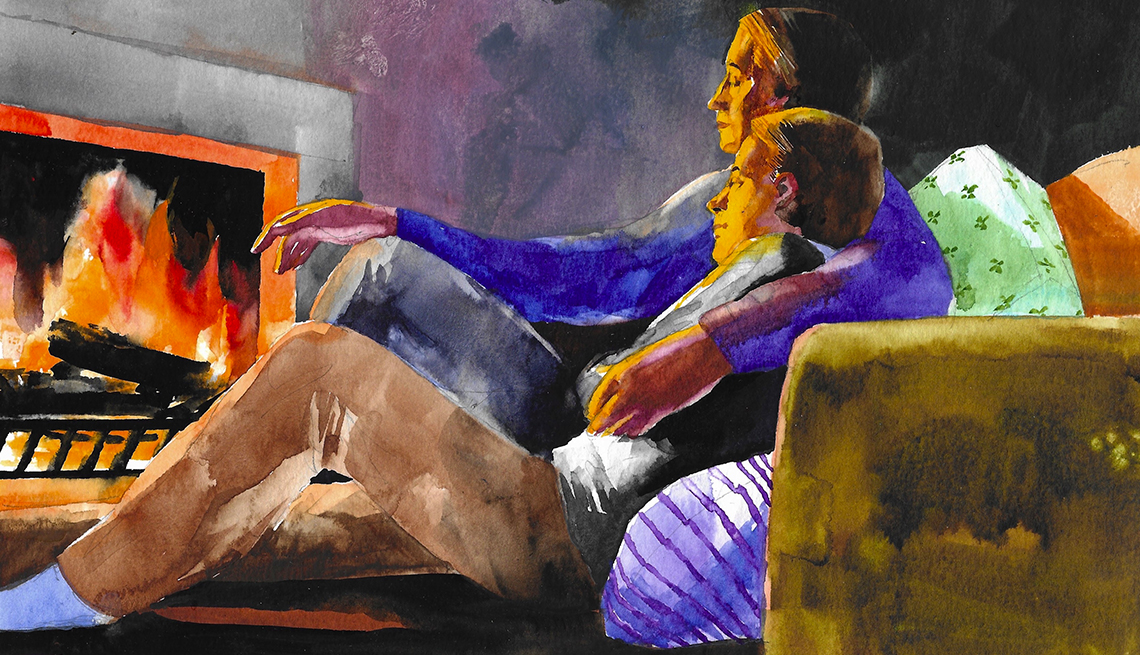
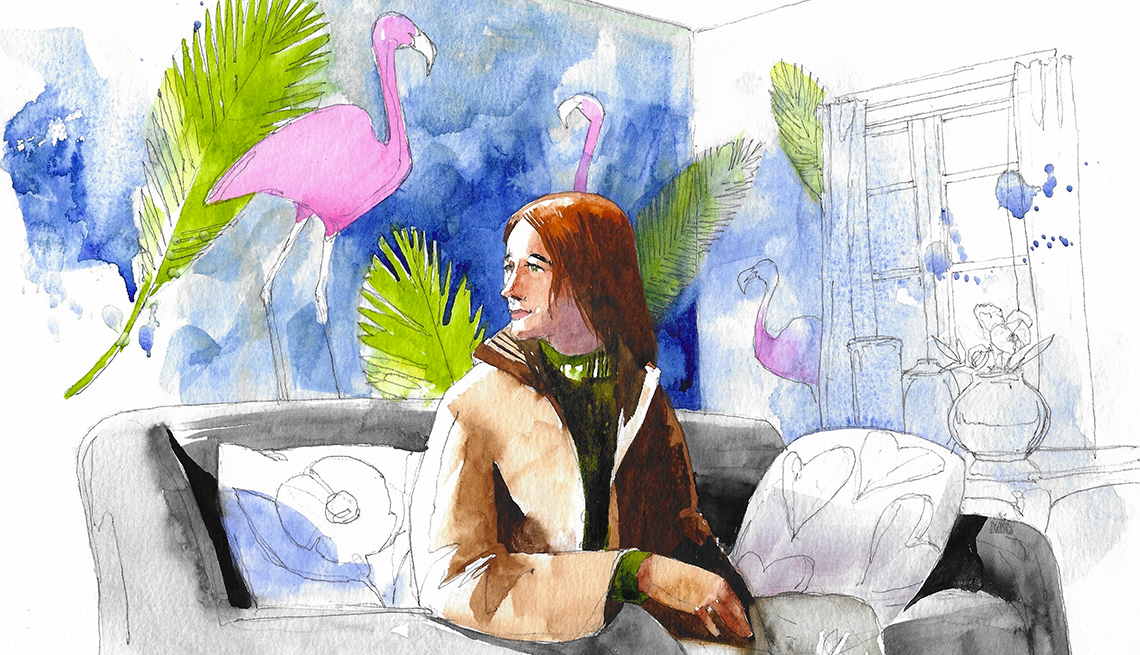
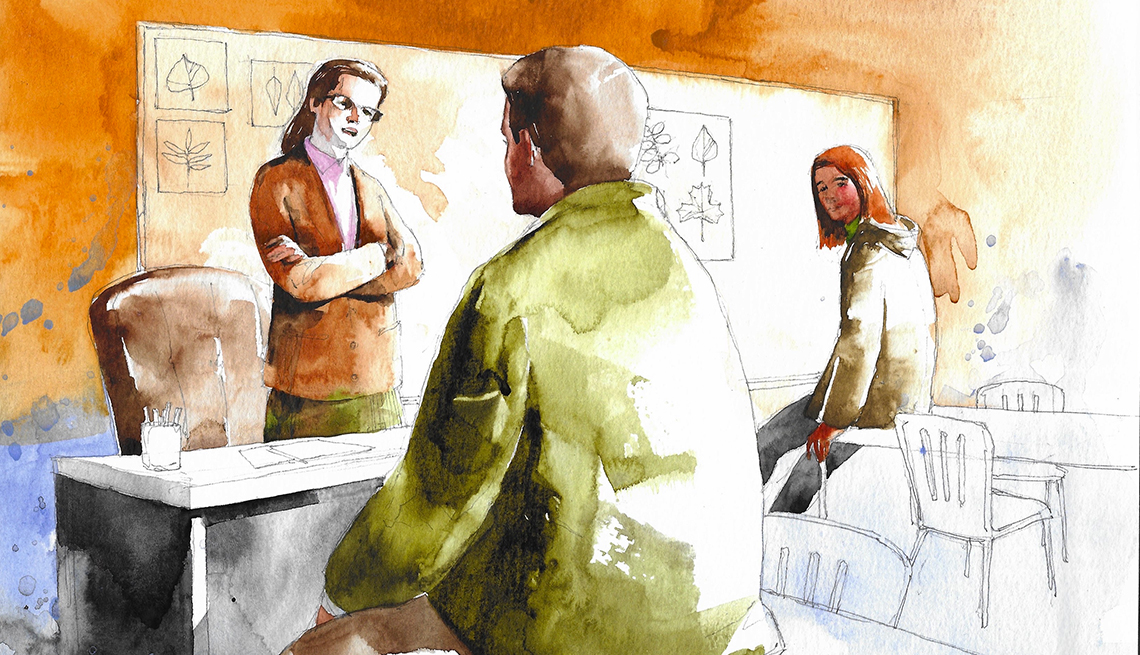
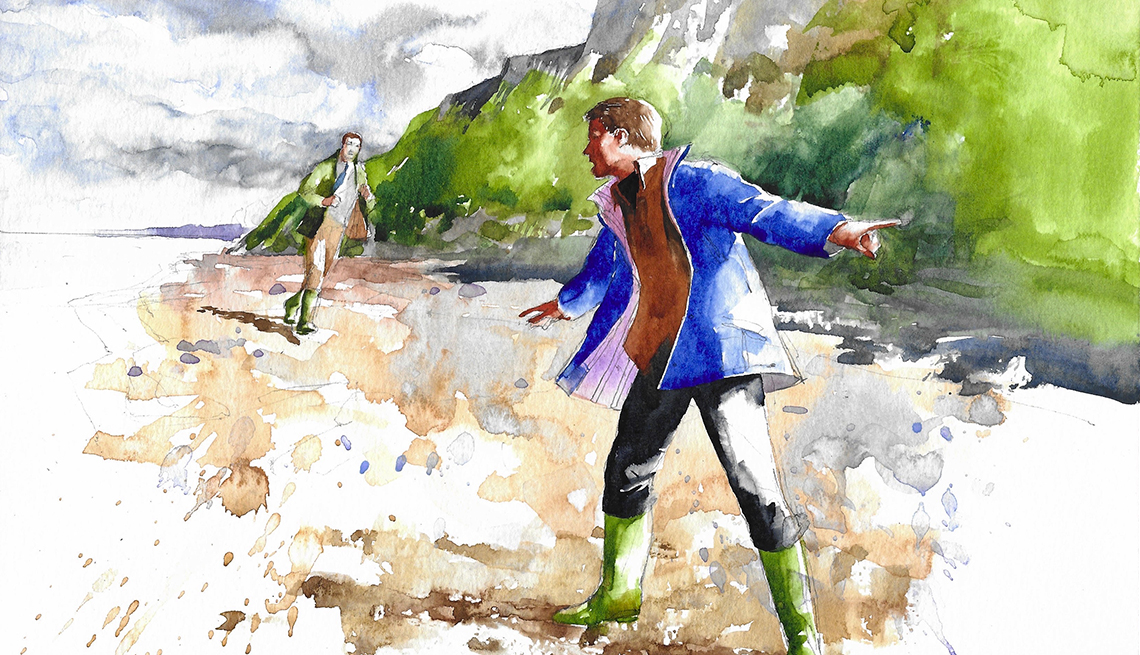
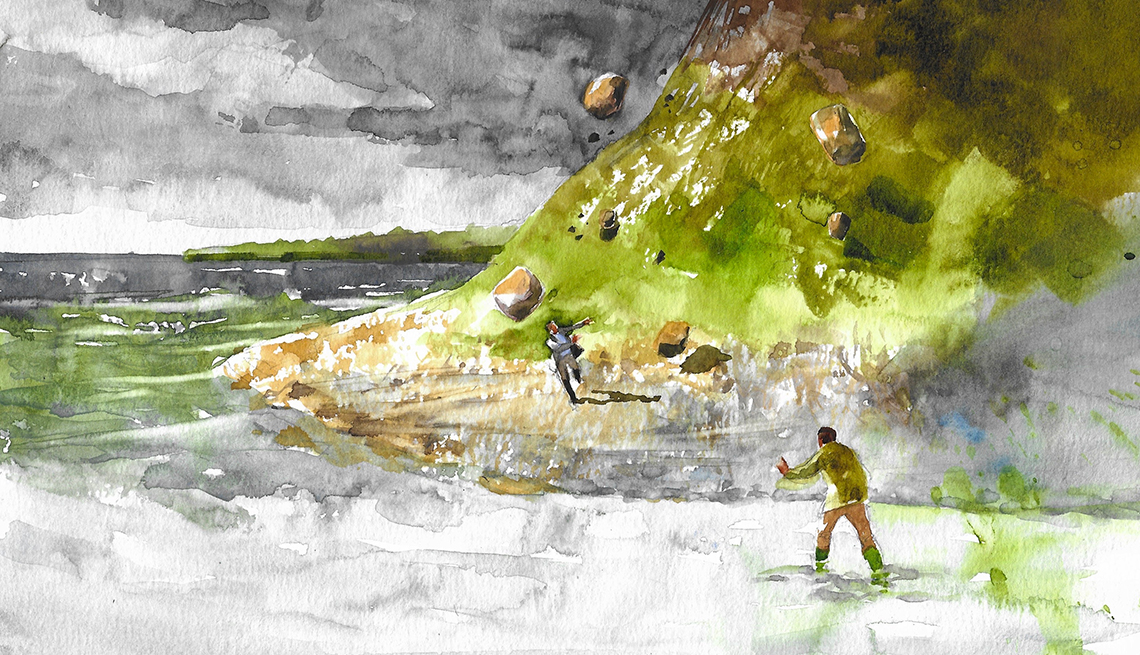
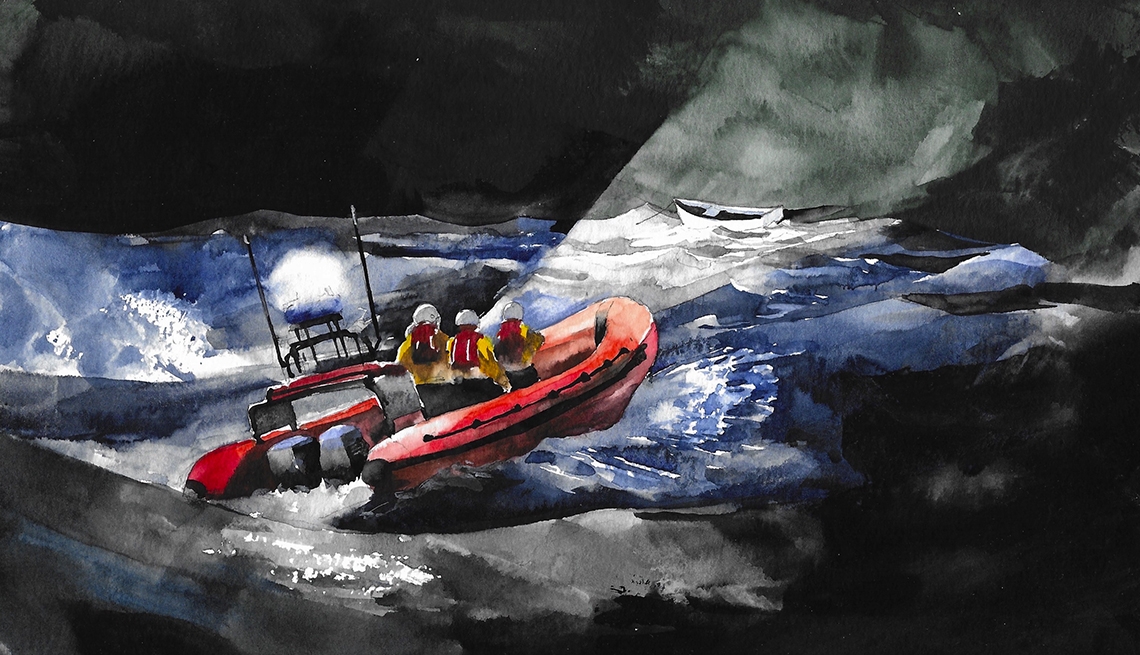
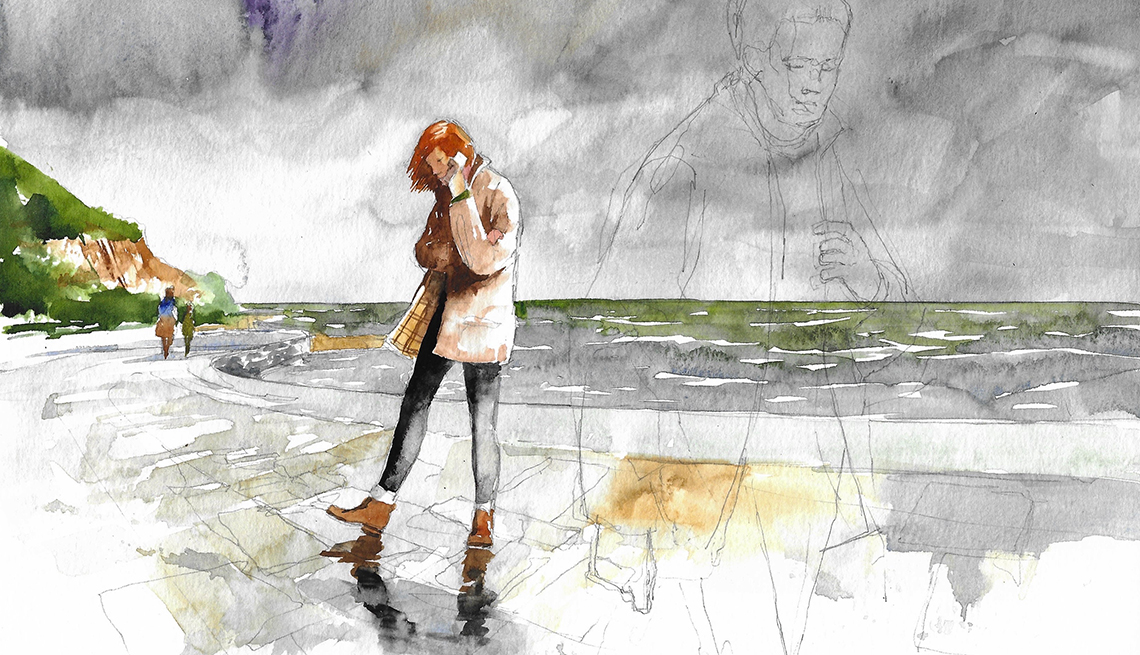

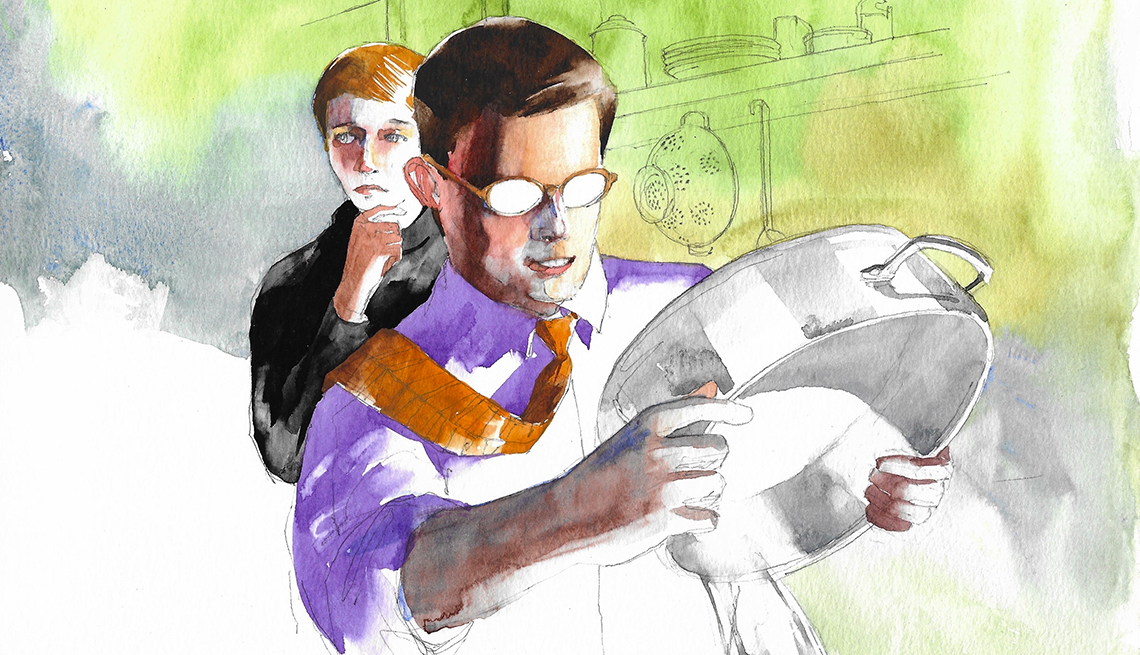





More From Ann Cleeves
‘The Long Call’
Book 1 in the Two Rivers series available free online
‘The Heron's Cry’
Book 2 in the Two Rivers series available free online
Short Story: ‘The Girls on the Shore’
Companion piece to ‘The Raging Storm’ available free online
A Chat With the Author
The best-selling British crime writer shares how ‘The Raging Storm’ differs from the first two books in the series